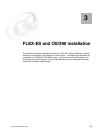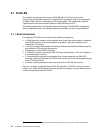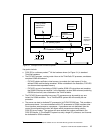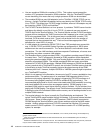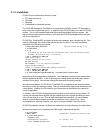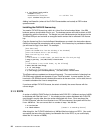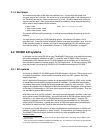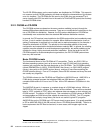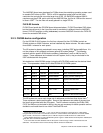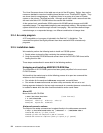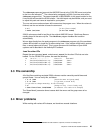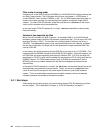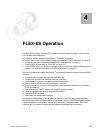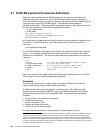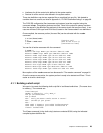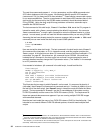
Chapter 3. FLEX-ES and OS/390 installation 23
The AWSCKD format was developed for P/390s where the underlying operating system used
to emulate CKD drives is OS/2. OS/2 is a 32-bit operating system and has the usual
restriction that a single file cannot be larger than 2 GB. An AWSCKD-emulated 3390-3
requires more than 2 GB, and is split into two AWSCKD files, the first is 2 GB and the second
is about .8 GB
9
. The two files are usually placed in a single ZIP file.
FLEX-ES formats
FLEX-ES can handle the CD-ROM format discussed above. FLEX-ES emulates CKD drives,
but the internal format (in the Linux files used for emulation) is different than the AWSCKD
format. FLEX-ES provides a utility (ckdconvaws) to convert AWSCKD format to the FLEX-ES
format for emulated CKD drives.
3.2.3 OS/390 device configuration
For the OS/390 R10 AD system, the first four volumes (first four CD-ROMs) contain an
IPLable system on 3390-3 volumes, and we installed only these volumes. We also created
three 3390-1 volumes for work space.
The AD system is already customized in many ways, including IODF device definitions. It is
not the purpose of this redbook to discuss general AD system design.
10
The following
sections mention specific S/390 device numbers (“addresses”) such as A80 for the IPL
volume. These addresses are included in the AD system; that is, they are included in the
IODF distributed with the system.
We decided our initial OS/390 system (using the AD CD-ROM) would use the devices listed
here. This represents a basic but IPLable OS/390 AD CD-ROM system.
The AD system can use a much larger set of addresses and devices than shown here.
11
These represent a basic useful system. Some of the addresses are arbitrarily chosen from
the larger set provided with this AD system. The AD volumes containing the DLIBs, DB2,
CICS, and IMS are not included in this list; they are not necessary for basic operation and we
decided to not install them for our initial ThinkPad/EFS work.
9
The two files contain the characters _1 and _2 as the last two characters of each file name. P/390 utilities
recognize that the second file is a continuation of the first. Unlike FLEX-ES, the P/390 does not emulate 3390-9
drives. If it did, it would use four 2 GB files plus a 1 GB file to equal the 9 GB contained on a 3390-9 drive.
10
A fairly detailed description of recent OS/390 AD systems is given in S/390 Partners in Development: OS/390 (and
z/OS) New User’s Cookbook, SG24-6204.
Address Device VOLSER FLEX-ES Name Comments
A80 3390-3 OS39RA /s390/OS39RA IPL volume; OS/390 libraries
A81 3390-3 OS3RAA /s390/OS3RAA More OS/390 basic libraries
A82 3390-3 OS39M1 /s390/OS39M1 Paging, parmlib, catalogs, etc
A87 3390-3 OS39HA /s390/OS39HA System HFS data sets
560 3480 FakeTape emulating 3480
700 3270 mstcon NIP & OS/390 master console
701-702 3270 L701 - L702 Local non-SNA VTAM
terminals
E20, E21 CTC eth0 Used for LAN TCP/IP interface
11
This means that the IODF distributed with the AD system contains a large number of defined devices and
addresses. We selected a subset of these already-defined devices and addresses.



